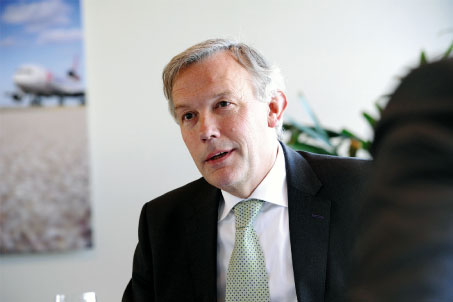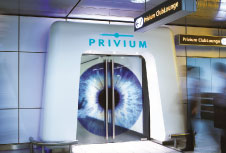
Nijhuis: “Schiphol can only grow and thrive if we incorporate the needs of people, the environment and the local region into everything we do. It is essential that we fulfil our corporate responsibility, as only then can we remain ‘Europe’s Preferred Airport’.”
Schiphol’s mission is to connect the Netherlands with the world’s major regional and urban centres, in partnership with its home carrier Air France-KLM and other airlines. The Netherlands has an international outlook and an open economy. “It is no exaggeration to say that ‘top connectivity’ is of critical importance to our country. That’s why we want our connections and frequencies to be best-in-class,” explained Nijhuis. “We also aim to offer excellent visit value, and function as an attractive hub for businesses, employees and visitors. Our objective is to generate long-term value for our stakeholders in everything we do. At Schiphol Group that means not only being profitable, but also safeguarding sustainable development. The three Ps – People, Planet and Profit – must be kept in balance.”
Amsterdam Airport Schiphol handled 49.8 million passengers in 2011 and forecast growth of +2% will see it exceed 50 million passengers in 2012 – a record for the airport. Given the extremely challenging economic conditions in Europe and the rest of the world, it is a respectable result. “First and foremost, we have our home carrier Air France-KLM and the other airlines to thank for that. They make sure that the number of passengers welcomed by Amsterdam Airport Schiphol continues to grow. We work side-by-side on quality services that aim to exceed passengers’ expectations. That means not just the trip itself, but all of the related facilities as well,” said Nijhuis. “People must perceive their time spent at Schiphol as quality time. Positive word-of-mouth advertising and messages on social media all benefit the reputation of our airport. That is why we always put the customer first.”
Amsterdam Airport Schiphol Fact Box
Passengers (2011): 49.8m (+10.1%)
Destinations served: 313
Companies located at Schiphol: 500
No. of people employed at Schiphol: 62,000
It is an award-winning strategy. At the ACI EUROPE Annual Assembly in June, Amsterdam Airport Schiphol won the ‘Best Airport Award’ in the over 25 million passengers category. “The bar is now very high indeed. A number of other European airports are working hard, and that inspires us to give it all we’ve got,” commented Nijhuis. Social media has improved Schiphol’s communication with passengers. It is very active on Facebook, where it has around 175,000 followers, as well as Twitter. In late-2010, it launched the Schiphol App, which has been downloaded around 700,000 times. There is also a Chinese version of the Schiphol App, which has similarly proven very popular.

Nijhuis: “We want to give travellers as much control as possible over their own journey. To achieve this, we have introduced a large number of self-service facilities, from baggage drop-off to passport control. Our Privium passengers can take advantage of fast border passage with the iris scan.”
Sustainability is at the heart of Schiphol’s activities. It is Airport Carbon Accredited at the ‘Optimisation’ level of the programme, the highest level possible without purchasing carbon offsets. Nijhuis believes it is important that Schiphol provides opportunities for innovation, such as the battery-changing station for electric taxis at the airport. Thermal energy storage is used to heat and cool the terminal, as well as Schiphol’s offices. “We are also collaborating with KLM on a biofuel breakthrough; on 19 June 2012, the longest biofuel-powered flight ever took off from Amsterdam Airport Schiphol. The KLM flight to Rio de Janeiro flew partly on fuel derived from spent deep-frying oil,” explained Nijhuis. “From 2014, Schiphol will start using electric buses to transport passengers to and from their aircraft. This represents an important new step towards reducing CO2 emissions.”
Schiphol’s award-winning efforts are all aimed at enhancing the passenger experience, as it strives to find solutions that ensure a comfortable travel process. It has achieved notable success as it aims to be ‘Europe’s Preferred Airport’. “The passenger journey remains at the heart of the way we think and what we do, and we will continue to further integrate Corporate Social Responsibility into our business processes,” concluded Nijhuis.







